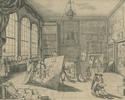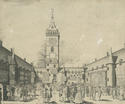 Robert Foulis (1707-1776) and Andrew Foulis (1712-1775) were at the forefront of the print trade in 18th century Glasgow and they contributed greatly to the development of Enlightenment print culture in the city. Robert was the eldest son of a Glasgow maltman. He was apprenticed to a barber, but he also attended the popular lectures of Francis Hutcheson, the Professor of Moral Philosophy at Glasgow. Hutcheson encouraged Robert to become a printer and bookseller.
Robert Foulis (1707-1776) and Andrew Foulis (1712-1775) were at the forefront of the print trade in 18th century Glasgow and they contributed greatly to the development of Enlightenment print culture in the city. Robert was the eldest son of a Glasgow maltman. He was apprenticed to a barber, but he also attended the popular lectures of Francis Hutcheson, the Professor of Moral Philosophy at Glasgow. Hutcheson encouraged Robert to become a printer and bookseller.
 Robert and his younger brother Andrew visited Oxford and then France, c. 1738-40, where they collected rare books and editions of the classics. They found a ready sales market for these books in London and then in 1741 Robert began bookselling in Glasgow. He set up his own printing press and in 1743 he was appointed as the official printer to Glasgow University. In 1743 he produced the first Greek book printed in the city, namely the Demetrius Phalereus de Elocutione.
Robert and his younger brother Andrew visited Oxford and then France, c. 1738-40, where they collected rare books and editions of the classics. They found a ready sales market for these books in London and then in 1741 Robert began bookselling in Glasgow. He set up his own printing press and in 1743 he was appointed as the official printer to Glasgow University. In 1743 he produced the first Greek book printed in the city, namely the Demetrius Phalereus de Elocutione.
 Andrew had originally intended to join the ministry of the Church of Scotland, but he decided to join his brother in the printing business. The editions of the classics produced by the Foulis brothers were renowned for their textual accuracy and the beauty of their type. Their greatest publication achievement is said to be that of a folio edition of Homer (1756-58) which contemporaries recognised as a masterpiece of literary and typographical accuracy. In 1753 Robert started a new venture with the foundation of an Art Academy in Glasgow for painting and sculpture. This preceded the foundation of the Royal Academy by almost fifteen years, but the venture was costly and too ambitious. When Robert died, he was heavily in debt due to the failed enterprise. Over a thirty-six year period the Foulis brothers produced over 554 works. The collection of books was sold in 1777. Many of these were deposited in the Mitchell Library, Glasgow.
Andrew had originally intended to join the ministry of the Church of Scotland, but he decided to join his brother in the printing business. The editions of the classics produced by the Foulis brothers were renowned for their textual accuracy and the beauty of their type. Their greatest publication achievement is said to be that of a folio edition of Homer (1756-58) which contemporaries recognised as a masterpiece of literary and typographical accuracy. In 1753 Robert started a new venture with the foundation of an Art Academy in Glasgow for painting and sculpture. This preceded the foundation of the Royal Academy by almost fifteen years, but the venture was costly and too ambitious. When Robert died, he was heavily in debt due to the failed enterprise. Over a thirty-six year period the Foulis brothers produced over 554 works. The collection of books was sold in 1777. Many of these were deposited in the Mitchell Library, Glasgow.